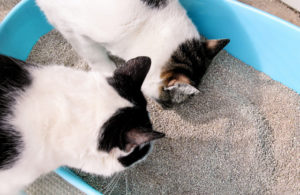Have you ever caught your cat eating poop or other unwanted materials? This behavior, known as pica, is when cats consume non-food items. There are various reasons why cats may engage in this behavior and it can be a cause of concern for pet owners. In this article, we will explore the three main causes of cats eating poop and how to effectively prevent it.

Why do cats eat fecal waste?
Cats can eat litter and other unwanted materials for many reasons. This behavior is called pica and can stem from many different causes. Sometimes, this is just a curious behavior and is not harmful to your cat’s health. However, in some cases, it can be a sign of an illness or behavioral problem. Below are the three main causes of feline eating behavior and how to treat them appropriately.
How to prevent cats from eating fecal waste?
To prevent your cat from eating fecal waste, you need to determine the specific cause of this behavior. If you suspect a health problem, you should take your cat to the vet immediately for diagnosis and treatment. If it is not a health problem, you can apply the following methods to prevent your cat from eating feces.
Close monitoring

If your cat is curious about eating poop, you can monitor it closely and stop it when you see this behavior taking place. Make sure that cats do not have access to places containing feces or other unsafe materials. You can also use sprays on unwanted materials to prevent cats from reaching them.
Change your diet
Some cats may eat poop because of a lack of nutrients in their diet. Make sure your cat has adequate nutrition and clean water to avoid anemia and other health problems.
Provide toys and activities
Cats may eat poop because they feel bored or inactive. Provide your cats with toys and activities to entertain them and keep them active and healthy.
Anemia

Eating litter can be a sign that your cat is sick, and anemia in particular is a condition where affected cats may exhibit this sign. Anemia occurs when there is a lack of red blood cells and hemoglobin in the blood. This can happen for many reasons, including:
Malnutrition: If your cat is not getting enough nutrition, especially iron and vitamin B12, they may become anemic.
Digestive diseases: Some digestive diseases such as enteritis, colitis or intestinal obstruction can cause anemia in cats.
Impaired kidney function: Cats with impaired kidney function may become anemic due to reduced red blood cell production.
Blood diseases: Blood diseases such as leukemia, congenital anemia or genetic diseases can cause anemia in cats.
If you suspect that your cat is anemic, take them to the vet for testing and treatment. If anemia is not treated promptly, it can cause serious health problems for your cat.
Digestive diseases

Some digestive diseases can cause feces-eating behavior in cats. This could be a sign of an illness or simply a symptom of poor digestion. Common digestive diseases include:
- Enteritis: This is a common disease in cats and can cause symptoms such as diarrhea, constipation or fecal ingestion.
- Colitis: This disease is a more severe form of enteritis and can cause more severe symptoms such as blood in the stool, abdominal pain, and eating stool.
- Intestinal blockage: If your cat has an intestinal blockage, they may eat stool to try to resolve the blockage.
- Digestive disorders: A number of different digestive disorders can cause fecal eating behavior in cats. If your cat has a persistent poop-eating behavior, take them to the vet for examination and treatment. Early treatment for digestive conditions can help prevent serious health problems for your cat.
Conclusion
In this article, we have learned the three main causes of feces-eating behavior in cats and how to handle them appropriately. If your cat has poop-eating behavior, determine the specific cause and apply the best prevention methods to help your cat live a healthy and happy life. At the same time, take your cat to the veterinarian for examination and treatment if necessary. Proper care and attention will help your cat become a happy and healthy family member.
